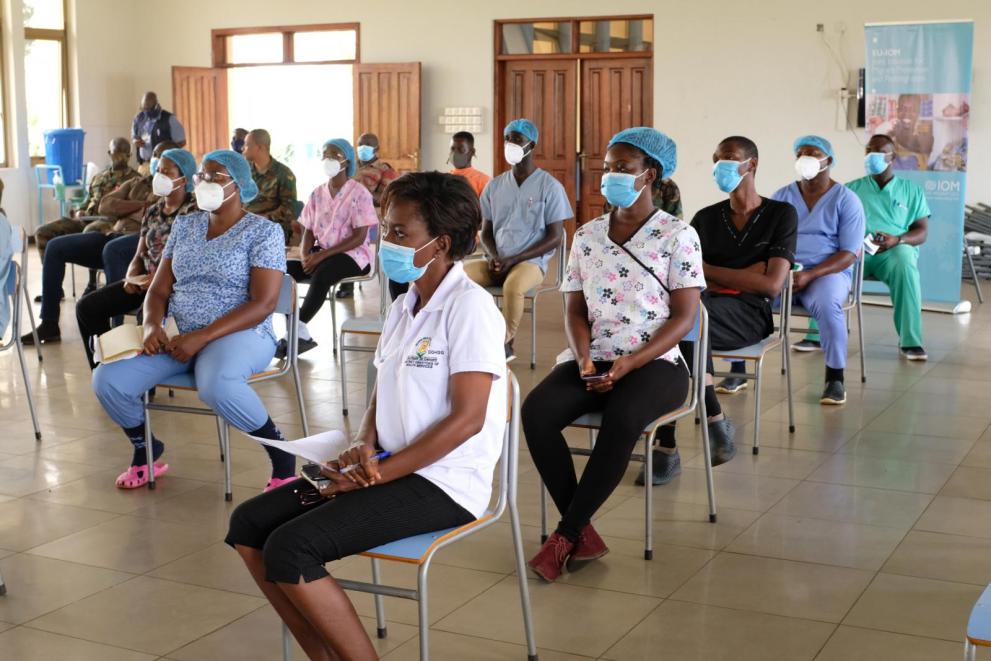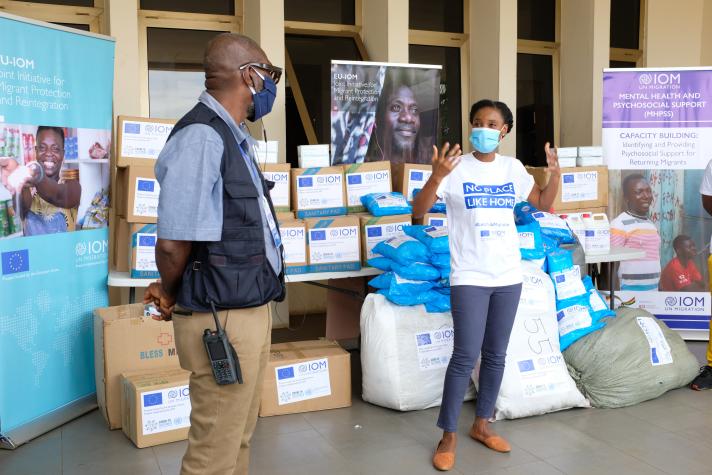
Accra - In Ghana, as part of the national COVID-19 response, the Government has stepped up its efforts to evacuate hundreds of Ghanaians stranded in various countries across the globe including West Africa. To allow for safe returns amid the pandemic, the government decreed a 14-day mandatory quarantine in facilities where returned migrants are being tested, monitored and offered adequate medical assistance.
In response to the increasing number of evacuations, the International Organization for Migration (IOM), with funding from the European Union, supported the Government with the provision of Personal Protective Equipment (PPE) to the Prampram Quarantine Centre which can host up to 230 returned migrants for their quarantine. The items donated include 6,440 masks, 460 soaps, 230 hand sanitizers, 230 mosquito nets and cleaning detergents.
Thanks to the equipment, the facility’s personnel will be able to deliver its services to returned migrants in a safe manner. Those who are in quarantine will also receive protective masks, hand sanitizers and hygienic kits including sanitary pads when they leave the facility and an additional USD 100 pocket money to cover their immediate needs.
Furthermore, IOM provided a training to 72 staff working in the facility to learn how to identify psychosocial needs of returned migrants and offer them psychological first aid.
“This training was really insightful and expanded our knowledge on mental health issues returnees might face when they return. We will now be able to cater to their mental health needs,” said Christabel Boateng, a doctor working at the Prampram Quarantine Centre.
Once they return to their communities, IOM provides continued psychosocial counselling to returnees in need– either directly or with support from local community influencers which IOM has previously trained.
The rising numbers of COVID-19 infections in the country (a total of 15,473 people tested positive (26/6) with 95 deaths), as well as the increasing number of Ghanaians returning home require urgent measures to counter stigma. The trainings provided by IOM put a special focus on anti-stigmatization and discrimination.
“Ghanaians continue to come home, and some of them have gone through difficult experiences in their host countries. We all need to work together now to ensure that these returns are safe and that they receive the medical and psychosocial support they need. It helps them to sustainably resume their lives here in Ghana,” said IOM Ghana Chief of Mission Sylvia Lopez-Ekra.
These activities are part of a series to be carried out in collaboration with the Ministry of Foreign Affairs and the Regional Integration, the National Disaster Management Organisation (NADMO), Ghana Health Service (GHS), and the Ghana Immigration Service (GIS).
“Both the donation and the psychosocial support training couldn’t have been timelier as we are expecting more migrants being quarantined at the centre,” said Gavivina Tamakloe, Chief Disaster Control Officer at NADMO.
The support to the migrants and the quarantine center was made possible thanks to the European Union funding through the European Union Emergency Trust Fund for Africa. Over 1,400 Ghanaians have been assisted with their voluntary return home since 2017. The psychosocial first aid training was funded by the German Corporation for International Cooperation (GIZ).
Details
- Publication date
- 3 July 2020
- Region and Country
- Regional
- Thematic
- Improved migration management
- Partner
- International Organization for Migration

